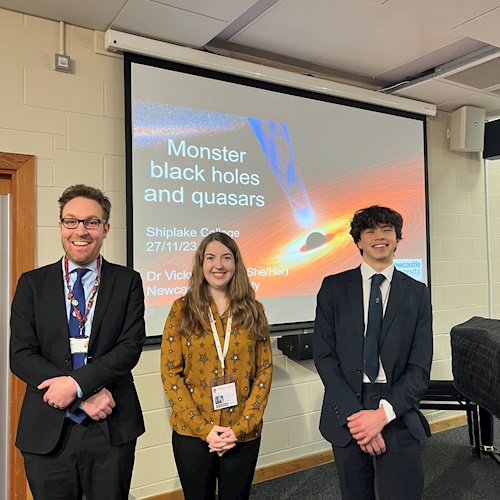
In the final Scholars’ Masterclass of the Autumn Term, we welcomed Dr Victoria Fawcett, a Research Associate at the University of Newcastle, to give a talk on astronomy.
Dr Fawcett an observational astronomer interested in the multi-wavelength properties of active galaxies. Her main research focus is dust reddened quasars and whether these are linked to galaxy evolution. She also does a lot of outreach events. which includes delivering astronomy talks to school pupils, often around the topic of black holes and so we were delighted to welcome her here at Shiplake!
In her fascinating talk, Dr Fawcett spoke of her journey into astronomy beginning at A-level where she studied maths, further maths, physics and chemistry. This was followed by an MSc Maths and Physics degree at the University of Warwick which included a masters project on exoplanets – which are planets outside the Solar System. Following on from this, Dr Fawcett went on to do an Astronomy PhD at Durham University where her thesis centred around the colours of quasars - massive and extremely remote celestial objects that emit huge amounts of energy and light. From there, she has been working as a Postdoctoral Research Associate at the University of Newcastle.
In the second part of her talk, Dr Fawcett talked about thy she went into research and why she chose that specific area of research, as well as what is actually involved. Having always like astronomy, she carried on in academia through the completion of her PhD and Post Doc. Her work has allowed her to do a lot of travelling which included working on the giant telescopes in Pune, India. And as a lot of her work involves huge amounts of data and simulations, Dr Fawcett has used super computers such as COSMA8, which has the power and memory of 17,000 home personal computers! With that amount of power, COSMA8 is used for simulations of the entire universe. Additionally, Dr Fawcett has worked on the instrumentation of the James Webb telescope. With a background in mathematics, there are a lot of pathways that are open and a career in higher education can lead to opportunities for travel, personal development, and the chance to work on exciting projects.
In the final part of her presentation, Dr Fawcett went into details about what she researches, specifically black holes. Dr Fawcett first explained what black holes are and also their structure. She then went into how we know they exist through the use of diagrams and simulations as they cannot be seen. However, what can be observed is how materials and planets interact in the vicinity of a black hole. Dr Fawcett also talked about super massive black holes and quasars in more detail before taking questions from the audience. Amongst the many questions was one on astrology and, coming from an astronomer, there is no correlation between a person’s personality and the position of stars!
Thank you so much to Dr Fawcett for taking the time to speak to our scholars! We’re sure that this opportunity will open up different routes and ideas to those considering a route into the STEM field.





















